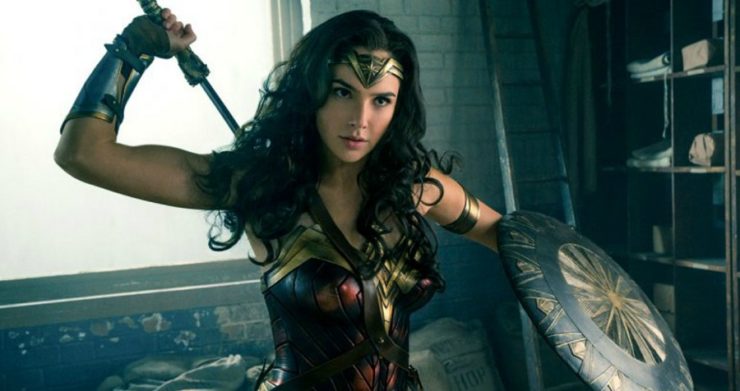I went into Wonder Woman practically vibrating with excitement. Not seeing it in the theater opening weekend didn’t even occur to me. It’s a movie starring Wonder Woman, the only superhero movie with a female lead, and the only major comic book franchise film directed by a woman in years*, of course I was going to see it. And I’m clearly not the only one freaking out. As of the time of this writing, Wonder Woman is projected to bring in $223 million worldwide, the third biggest opening of the DCEU. Patty Jenkins now has the distinction of having the best domestic opening weekend of any female director. Unlike most superhero movies where women make up about 40% of the audience, Jenkin’s audience opening weekend was 52% female. Get ready, dudebros. The future is female and the future is now.
Spoilers ahoy.
Wonder Woman is a love letter to feminism. The movie is all heart and soul—an earnest, honest, empathetic story about how love conquers all. It carries along the best elements from the comics and stays true to the spirit of what makes Wonder Woman such an inspiring hero. When we first meet Diana as a child, Hera help me, I squealed. This is the origin story I always wanted. More than just watching a future superhero learn how to fight, we see a girl growing up to become a young woman with the support and love of her community.
When she leaves paradise they know it’s because she must. If she stayed behind, she would not be the woman they’ve raised her to be. Hippolyta’s final words to Diana cut deep. She’s sad that her only child is about to venture out into the wide world alone and without the protection of her family, sorry that the world has fallen so low that only an Amazon can save it, and disappointed that her daughter rejects the path laid out for her. But there’s also pride that Diana would risk everything to do what’s right.
Women taught her to trust her intelligence and skill, then they set her loose upon the world. Wonder Woman fights not for the love of battle but to end it as quickly as possible, in order to save as many lives as she can. When Veld is destroyed after Steve’s delay, she feels the loss of every life. Hippolyta and Antiope raised her to do more than resist and persist. She crosses No Man’s Land, frees Veld, ditches a reluctant Steve, and takes on Ares—not because of fame or fortune or to fan her own ego, but simply because it’s the right thing to do.
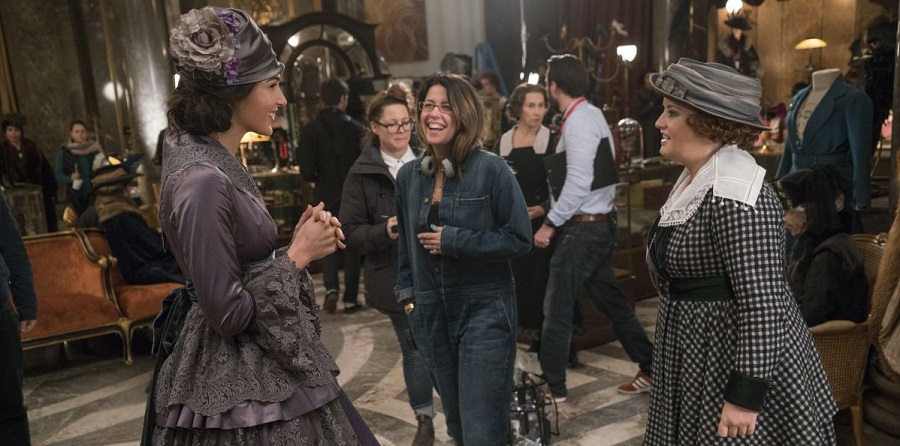
Wonder Woman is awesome, and it’s all thanks to Patty Jenkins and her swell cast. While I still don’t love Gal Gadot as Diana—she’s not nearly buff enough for an Amazon warrior princess who’s presumably spent centuries training with the baddest, toughest women on the planet, especially when compared to other Amazons—she is, admittedly, charming. Connie Nielsen (Hippolyta), Robin Wright (Antiope), and Ann Ogbomo (Philippus) bring fierceness to the Amazons, which pairs nicely with the untamed eagerness of Lilly Aspell (Diana at age 8) and Emily Carey (Diana at age 12).
Chris Pine is pitch perfect as Steve Trevor, and he goes down as one of the few fictional characters whose death I will never get over (see also: Ianto Jones, Joyce Summers, Jen Lindley, and Littlefoot’s mom). His crew, including Ewen Bremner (Charlie), Saïd Taghmaoui (Sameer), and Eugene Brave Rock (The Chief), are so good that it breaks my heart that we’ll never see them again. Lucy Davis (Etta Candy) sparkles with what little she’s given to do. Elena Anaya sizzles as Dr. Poison, Danny Huston frightens as the drugged-up Ludendorff, and David Thewlis is so good at playing a character as over-the-top as Ares. He’s no Kevin Tod Smith, but those are some very tight leather pants to fill.
So much love to Jenkins, here: that she could put an attractive woman in a miniskirt and halter top and never let the shoot devolve into objectification is both a welcome respite and an impressive feat, given that Wondy’s first DCEU appearance paraded her around in black lingerie. In this film, Diana is always shot from positions of power, even when she’s weak. And how can you not love those slow motion fight sequences? I also need to mention just how amazing it was to have such a diverse supporting cast—I genuinely teared up at all those glimpses of people of color in London. However, I’d be remiss if I didn’t chide the film for that “smoke signals” nonsense, which totally ruins the high from The Chief speaking Blackfoot earlier. Not cool, DCEU.
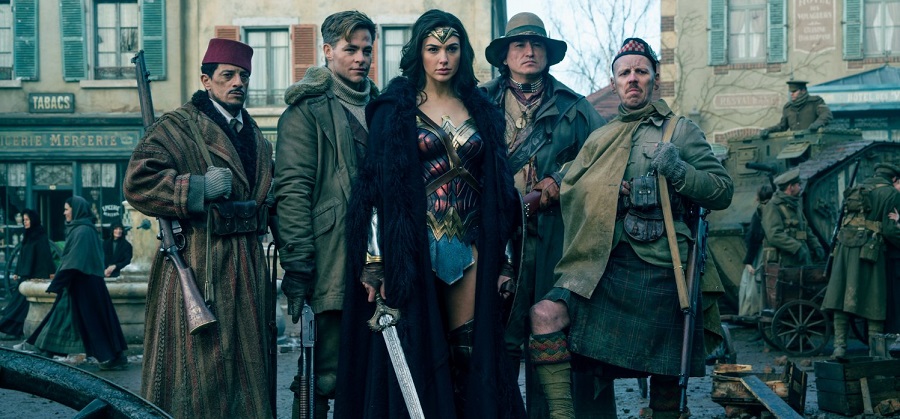
Overall, Wonder Woman is a fantastic movie, but it also suffers the same structural problems common to the DCEU. The third act is shaky at best, poorly planned at worst, and messily illogical either way. Plot holes abound, some big enough to fly that oversized bomber plane through. Character development is spotty for everyone who isn’t a main protagonist. Why was The Chief in Europe? For that matter, why was Steve working for the UK instead of the US in the first place? What was Sameer doing in London? What happened to Charlie to leave him shell-shocked and traumatized? Why are they hanging out in pubs instead of fighting? What does Etta do when Steve isn’t around? It’s as if these characters only come to life when Diana and/or Steve turn up. What little we know of their pasts serves only to buttress the arcs of the protagonists, and the villains are just as thinly developed.
At the end of the day, the side characters exist only to flesh out Wonder Woman and Steve. Without any real growth or exploration of their personal lives and without giving these characters much depth from the start, they’re hardly more than chatty plot devices. On one hand, I love that an Indigenous character lives to see the final credits. On the other hand, that he’s Blackfoot is basically all we know about The Chief. Etta Candy is a relatively intelligent woman with good fashion sense who is also insecure about her weight. And that’s it; that’s all we’re given. It’s like the DCEU only cares about the stars, everyone else be damned.
No matter how objectively great Wonder Woman is, its high tide won’t raise the rest of the DCEU’s boats. What makes Wonder Woman work is that it is in direct contrast to every other DCEU flick, and not just because it’s more or less a standalone with no post-credit stings or cliffhangers. It isn’t drowning in darkness or testosterone. It isn’t filled to the brim with glowering, grumpy men punching each other into oblivion. It isn’t about anger or hatred or rage. Instead it’s a sunny, lovely, feminist film.
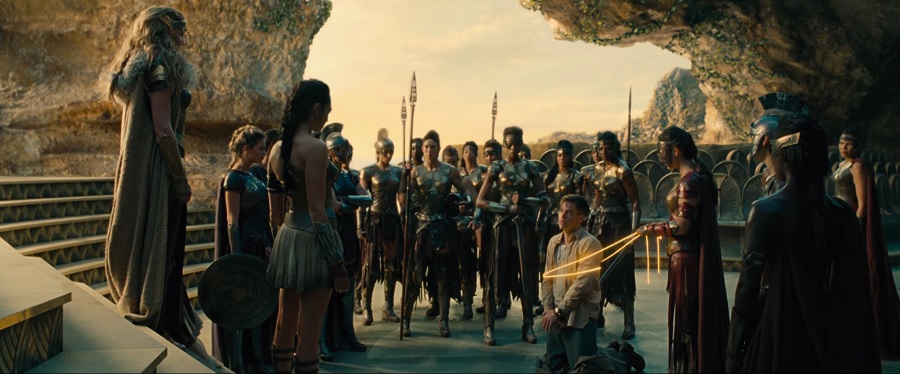
At the same time, Wonder Woman isn’t exactly the feminist powerhouse I was promised. I can’t tell you how disappointed I was that Dr. Poison wasn’t the Big Bad, that Etta Candy was trotted out as comic relief before being forgotten entirely, and that Themyscira wasn’t an island full of queer Amazons. The end result is two-and-a-half hours of missed opportunities, from a feminist perspective.
Themyscira was rife with female empowerment and friendship, yet there were no overt homosexual or homoromantic relationships. Wonder Woman is canonically bisexual, but the movie would have you believe that the hundreds of women living on a female-only island for thousands of years are just gal pals. I mean, come on. At least most of the Themyscira scenes pass the Bechdel Test (although the whole damn movie fails the DuVernay Test). Once Diana hits the outside world she interacts with a grand total of four women: Etta, Dr. Poison, the Veld woman in the trenches, and the snooty German female socialite. Only the first two have significant lines, and neither get more than the barest hint of character development. Given her woman-dominated background, it makes more sense to have Diana seek a connection with Etta than with Steve and co. If anything, she should’ve suggested Etta come to the Front, even if Etta refused. That way, her role as secretary would clearly be her choice rather than an order she’s forced to obey. And it would’ve been nice to see her thrive in that homefront role, a sort of proto-Rosie the Riveter but for espionage strategy.
Dr. Poison is the most egregious example of the film’s wasted feminist potential. She doesn’t really do much but snicker while watching people die and look embarrassed when Steve hits on her. She has no discernible motivations or history. She isn’t even a red herring. Dr. Poison is tossed aside just like Etta; we know more about her toxins and what Ludendorff plans to do with them than we know about her as a person.
Sure, Ares makes for a chilling enemy, but imagine how awesome a Wonder Woman movie would be with a female hero teaming up with her female BFF to take down a female Big Bad. Think of the conversations we could’ve had as three women battle each other and Western gender stereotypes. Picture the Veld woman being inspired by Wondy’s power, grabbing a gun, and joining her in No Man’s Land; Diana learning to find value in intellectualism and domesticity alongside her warrior mentality; Dr. Poison turning to the dark side after years of being Rosalind Franklin-ed by her male counterparts; or Etta incorporating Diana’s determination and drive to grow beyond her proscribed passivity. *Sigh*
Ultimately, Wonder Woman isn’t as feminist as it thinks it is, but it’s also very, very, very, far from the misogyny and sexism that permeates the rest of the DCEU. Wonder Woman is more respectful and inclusive than second-wave feminism, but isn’t progressive enough to be considered intersectional. Where the film stumbles, however, the characters soar. I’ll take Diana’s empathetic feminism and Steve Trevor’s allyship over the drudgery of watching Bruce Wayne make crude passes at Diana any day.
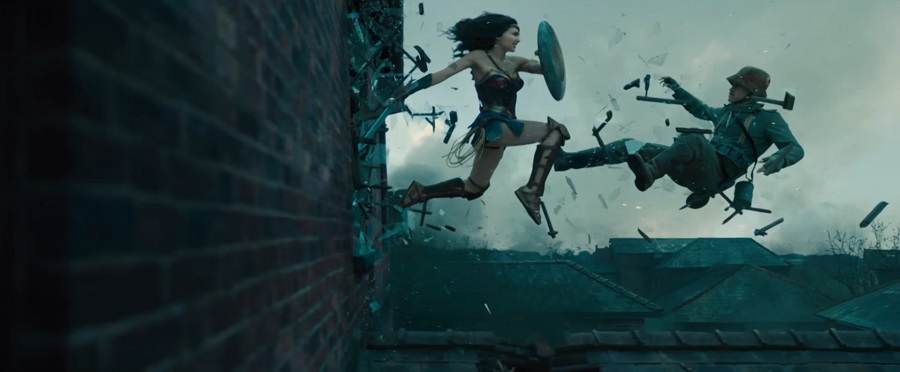
This is going to sound contradictory to everything I just wrote, but despite disliking the aspects of what Wonder Woman wasn’t, I absolutely loved what it was. I’ve never paid to see a DCEU movie before (usually I just borrow a DVD from someone), but I’m already planning my second trip to Wonder Woman. I walked out of the theater with every thought turned to Diana. She’s the last thing I’ve been thinking about before falling asleep and the first thought I have when I wake. Since Thursday, every person I know has had to deal with me accosting them with Wonder Woman accolades. I spent a solid two hours Friday morning scouring the interwebs for Wondy toys. My $15 for the sequel is in hand and ready to go. To quote Gail Simone, “By the way, I plan to stop talking about Wonder Woman roughly three years after I am dead. Maybe not even then.”
The moment I fell in love with Wonder Woman took place about an hour and a half or so into the movie. Diana and the boys have crossed No Man’s Land and are set on taking back Veld from the Germans. They made quick work of the foot soldiers and Diana tosses a freaking tank across the square, and all that’s left is a sniper in a church bell tower. Poor Charlie can’t bring himself to shoot the guy, so Diana leaps off a makeshift ramp and LITERALLY EXPLODES THE TOWER WITH HER MIGHT. As the dust settled, both I and the woman sitting next to me simultaneously exclaimed “Awesome!” Neither of us knew the other, but both of us were enraptured. We were sharing this experience in a theater full of women of all ages (the only men were there with other women, but there were plenty of solo and groups of women in attendance). The young girl behind me squealed in delight as pre-teen Diana learned how to fight, and the older woman half a row down gasped as Diana held her own against a volley of machine gun fire.
And that’s why Wonder Woman is the best. I haven’t felt this jazzed up by a movie since Rogue One. All those little girls geeking out over having their very own superhero is why I can set aside the movie’s wonkier elements, and all those women now motivated to set foot in a comic book shop. And even all those men who see Steve Trevor being a male ally and finally step up to the plate.
While my interest in the rest of the DCEU is still slim to none, you bet your ass I’ll be front row center when Wonder Woman 2 comes out. If comic book movies want to survive past Phase Two, the only way it’ll happen is through diversity, both in front of and behind the camera. Here’s hoping Patty Jenkins is setting a new precedent rather than continuing to serve as the exception.
*Punisher: War Zone, directed by Lexi Alexander in 2008 broke this particular glass ceiling, before the start of either the MCU or DCEU.
Alex Brown is a teen librarian, writer, geeknerdloserweirdo, and all-around pop culture obsessive who watches entirely too much TV. Keep up with her every move on Twitter and Instagram, or get lost in the rabbit warren of ships and fandoms on her Tumblr.










